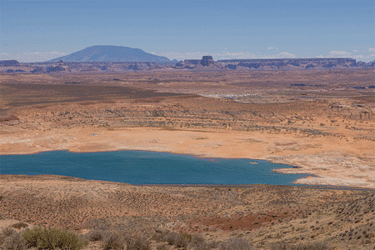Lake Powell Hits Its Lowest Water Level Since Being Filled, Raising Questions About Drought Response


In the latest alarming milestone for dwindling water supplies in the West, one of the most important reservoirs in the world has been brought to the lowest point in its history.
“Lake Powell, the nation’s second-largest reservoir and one that provides water and power to millions of people in southern California, has reached its lowest levels since its first filling in the 1960s,” USA Today reported. “If the lake’s level falls much lower, it won’t be possible to get water out of it … If the lake falls another 32 feet — about the amount it fell in the past year — power generation concerns become more urgent.”
Water managers have been on high alert concerning Lake Powell and its companion reservoir, Lake Mead, for months as increasing drought and consumption demands bring them to the brink of complete dryness. Last year, researchers concluded that the reservoirs’ levels were unlikely to remain stable. Federal officials have asked the states that utilize the Colorado River, which feeds these reservoirs, to agree on consumption cutbacks, but those negotiations have not been fruitful.
But even with Lake Powell hitting a new low, it’s hard to imagine immediate reversal of the fundamental problems that are driving the western drought and imperiling the Colorado River.
“More than four scientific studies have pinned a large part of the decline on human climate change,” according to USA Today. “It’s partly that there’s less rain and snow, partly that as temperatures rise, plants use more water and more water evaporates out of the soil which would otherwise have ended up in the river. In addition, the river itself experiences more evaporation.”
While there seems to be little that any immediate action can achieve, aside from motivating the states using Colorado River water to cut back, the consequences of an empty Lake Powell could ultimately change our relationship with water sources around the world forever.
“Experts agree that urgent water policy reform is needed to protect the Colorado River reservoirs,” per Newsweek. “Experts have put the ongoing megadrought down to climate change. This means in the long term, there also needs to be initiatives in place that will prevent climate change from worsening.”
To read more about how the drought is impacting water systems, visit Water Online’s Water Scarcity Solutions Center.
